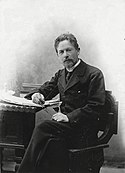Anton Chekhov Quote
Nadya Zelenin and her mother had returned from a performance of Eugene Onegin at the theatre. Going into her room, the girl swiftly threw off her dress and let her hair down. Then she quickly sat at the table in her petticoat and white bodice to write a letter like Tatyana's.'I love you,' she wrote, 'but you don't love me, you don't love me!'Having written this, she laughed.She was only sixteen and had never loved anyone yet. She knew that Gorny (an army officer) and Gruzdyov (a student) were both in love with her, but now, after the opera, she wanted to doubt their love. To be unloved and miserable: what an attractive idea! There was something beautiful, touching and romantic about A loving B when B wasn't interested in A. Onegin was attractive in not loving at all, while Tatyana was enchanting because she loved greatly. Had they loved equally and been happy they might have seemed boring.("After The Theatre")
Nadya Zelenin and her mother had returned from a performance of Eugene Onegin at the theatre. Going into her room, the girl swiftly threw off her dress and let her hair down. Then she quickly sat at the table in her petticoat and white bodice to write a letter like Tatyana's.'I love you,' she wrote, 'but you don't love me, you don't love me!'Having written this, she laughed.She was only sixteen and had never loved anyone yet. She knew that Gorny (an army officer) and Gruzdyov (a student) were both in love with her, but now, after the opera, she wanted to doubt their love. To be unloved and miserable: what an attractive idea! There was something beautiful, touching and romantic about A loving B when B wasn't interested in A. Onegin was attractive in not loving at all, while Tatyana was enchanting because she loved greatly. Had they loved equally and been happy they might have seemed boring.("After The Theatre")
Related Quotes
They took one look at me,And hated my black face.They took one look at me,And decided on my fate.They took one look at me,And forced an unknown fear.They took one look at me,And caused the shed of tea...
About Anton Chekhov
Chekhov renounced the theatre after the reception of The Seagull in 1896, but the play was revived to acclaim in 1898 by Konstantin Stanislavski's Moscow Art Theatre, which subsequently also produced Chekhov's Uncle Vanya and premiered his last two plays, Three Sisters and The Cherry Orchard. These four works present a challenge to the acting ensemble as well as to audiences, because in place of conventional action Chekhov offers a "theatre of mood" and a "submerged life in the text". The plays that Chekhov wrote were not complex, but easy to follow, and created a somewhat haunting atmosphere for the audience.
Chekhov at first wrote stories to earn money, but as his artistic ambition grew, he made formal innovations that influenced the evolution of the modern short story. He made no apologies for the difficulties this posed to readers, insisting that the role of an artist was to ask questions, not to answer them.
